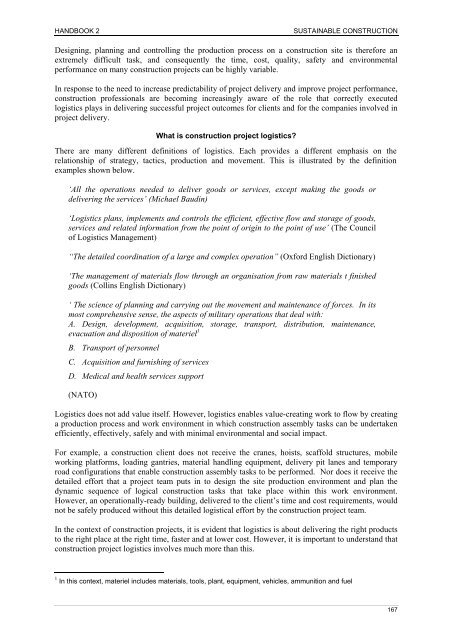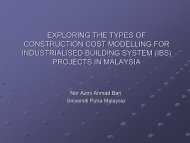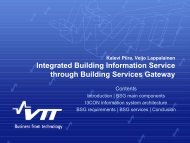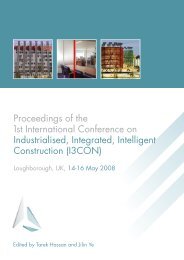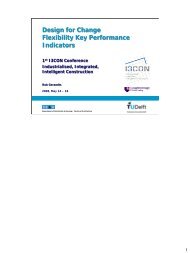Industrialised, Integrated, Intelligent sustainable Construction - I3con
Industrialised, Integrated, Intelligent sustainable Construction - I3con
Industrialised, Integrated, Intelligent sustainable Construction - I3con
Create successful ePaper yourself
Turn your PDF publications into a flip-book with our unique Google optimized e-Paper software.
HANDBOOK 2 SUSTAINABLE CONSTRUCTION<br />
Designing, planning and controlling the production process on a construction site is therefore an<br />
extremely difficult task, and consequently the time, cost, quality, safety and environmental<br />
performance on many construction projects can be highly variable.<br />
In response to the need to increase predictability of project delivery and improve project performance,<br />
construction professionals are becoming increasingly aware of the role that correctly executed<br />
logistics plays in delivering successful project outcomes for clients and for the companies involved in<br />
project delivery.<br />
What is construction project logistics?<br />
There are many different definitions of logistics. Each provides a different emphasis on the<br />
relationship of strategy, tactics, production and movement. This is illustrated by the definition<br />
examples shown below.<br />
‘All the operations needed to deliver goods or services, except making the goods or<br />
delivering the services’ (Michael Baudin)<br />
‘Logistics plans, implements and controls the efficient, effective flow and storage of goods,<br />
services and related information from the point of origin to the point of use’ (The Council<br />
of Logistics Management)<br />
“The detailed coordination of a large and complex operation” (Oxford English Dictionary)<br />
‘The management of materials flow through an organisation from raw materials t finished<br />
goods (Collins English Dictionary)<br />
‘ The science of planning and carrying out the movement and maintenance of forces. In its<br />
most comprehensive sense, the aspects of military operations that deal with:<br />
A. Design, development, acquisition, storage, transport, distribution, maintenance,<br />
evacuation and disposition of materiel 1<br />
B. Transport of personnel<br />
C. Acquisition and furnishing of services<br />
D. Medical and health services support<br />
(NATO)<br />
Logistics does not add value itself. However, logistics enables value-creating work to flow by creating<br />
a production process and work environment in which construction assembly tasks can be undertaken<br />
efficiently, effectively, safely and with minimal environmental and social impact.<br />
For example, a construction client does not receive the cranes, hoists, scaffold structures, mobile<br />
working platforms, loading gantries, material handling equipment, delivery pit lanes and temporary<br />
road configurations that enable construction assembly tasks to be performed. Nor does it receive the<br />
detailed effort that a project team puts in to design the site production environment and plan the<br />
dynamic sequence of logical construction tasks that take place within this work environment.<br />
However, an operationally-ready building, delivered to the client’s time and cost requirements, would<br />
not be safely produced without this detailed logistical effort by the construction project team.<br />
In the context of construction projects, it is evident that logistics is about delivering the right products<br />
to the right place at the right time, faster and at lower cost. However, it is important to understand that<br />
construction project logistics involves much more than this.<br />
1 In this context, materiel includes materials, tools, plant, equipment, vehicles, ammunition and fuel<br />
167


